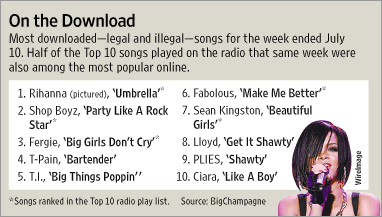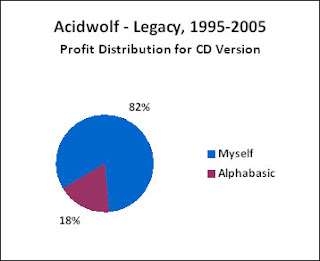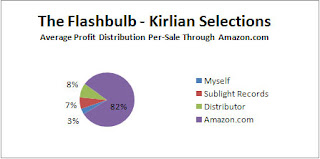Kenny Chesney, Brooks & Dunn, Sugarland, Sara Evans, Pat Green
Saturday 7/7/07
Qwest Field-Seattle, WA
Gross: $3,281,121
45,939/45,939 (100%)
Ticket prices: $91.50/$51.50
That's a lot of fucking money.
I'd say if you want to profit in the future, rather than hunt down the latest rap star, you should be trolling for cowboy hats. These guys do well EVERYWHERE! And by that I mean recorded music sales, TV, live gate, merch...
It all works in country music.
But in the pop world?
The labels want to sell records. A lot, quickly. The manager of a developing act might want to move slowly. An act with traction might want to say no. The interests are opposed.
In order to have success today, all interests must be aligned. Do you want these under the corporate umbrella?
Probably not. You want an independent thinker, a MANAGER!
Country speaks to people. Too many Top Forty records make people move, but they slide right off of them. They're background, not primary. Country music is primary in people's lives.
And don't think this is solely about the "festival", the multiple headliners. Kenny Chesney, supported by Pat Green, hardly a superstar, sold out the Sleep Train Amphitheatre in Marysville, CA (17,384) the Tuesday before, and the Shoreline Amphitheatre in Mountain View, CA (16,783) the Monday before.
There's something happening here, do you know what it is, Mr. Jones?
Rush
Monday 7/2/07
Nikon at Jones Beach Theater, Wantagh, NY
Gross: $860,671
12,300/13,851 (88.8%)
Ticket prices: $125.50/$29.50
They've only sold 213,620 copies of their new album, "Snakes & Arrows", but their fans still want to see them live.
If they didn't have a record deal, I'd tell them to go all Prince on us. Rather than report anemic SoundScan figures, why not just give the album away to the diehard fans, who are paying to see them, who want to see them, oftentimes at high prices.
Otherwise, they'll never be able to play the new material in concert, everybody will go to the bathroom. They'll just be able to play the hits.
It's about getting your music HEARD! It's not about how many CDs you sell. By focusing on selling product, acts are actually hurting themselves. Don't tell their record labels, but the performers have got to know this. Every act that the big label built...unless the big label can provide incredible visibility, should put out its album itself. It'll make all the money. And, as we move to Web distribution, people can find the tracks on iTunes from indies as easily as those from majors. And most of these acts ARE NOT GOING TO GET ON THE RADIO ANYWAY!
John Mayer, Ben Folds, Brett Dennen
Friday 6/22/07
Smirnoff Music Centre, Dallas, TX
Gross: $748,881
19,552/19,552 (100%)
Ticket prices: $55.50/$35.50
Friday 6/1/07 (with Rocco DeLuca instead of Brett Dennen)
Amphitheater in Clark County, Ridgefield, WA
Gross: $384,594
9,505/17,650 (53.9%)
Ticket prices: $53.50/$29.00
He doesn't sell out everywhere, but he averages about 10,000 paying customers a night. And that's VERY GOOD!
Attribute it to his hit songs. Attribute it to his focus on playing. He appears legit in a sea of impostors.
But that's not why I'm writing about this. I'm writing about this tour because of Mayer's endorsement deal with BlackBerry.
Yes, "Hits" mentioned this today. It just shows that other people are noticing. And isn't that the point?
I saw the ad in a magazine and paused for a minute, thinking THAT'S COOL!
Unfortunately, the BlackBerry is cooler than John Mayer AND his music. But I want to applaud the innovative thinking here. If you're going to do endorsements, and I'm AGAINST THEM (you profit, but they cheapen the music) align yourself with a hip company, not just one that will write you a check.
But I'd rather play with my new BlackBerry 8830 World Edition than listen to Mr. Mayer's discs. Although some of the tracks are good. Like "Waiting On The World To Change" and "Slow Dancing In A Burning Room". If only they were as good as the white rock/blues records of the sixties, if only they stretched the format, added something new. Still, you've got to hand it to this guy. He's overexposed, he dates a bimbo, and he STILL sells tickets, he STILL means something. This is tribute to how EASY it is if you just focus on the talent.
People think John Mayer is talented. They don't think ANY "American Idol" winner is talented. Focus on talent.
True Colors Tour: Cyndi Lauper, Erasure, Deborah Harry, The Dresden Dolls, Margaret Cho
Thursday 6/21/07
Chastain Park Amphitheatre, Atlanta, GA
Gross: $486,801
6,687/6,687 (100%)
Ticket prices: $79.00/$39.00
Not every date was a sellout. The tour only did 2,603 out of 4,798 in San Diego. But other gigs varied in attendance from 4,000-10,000. And that's a good sign, if you're BUILDING SOMETHING!
And that's what Cyndi Lauper is doing here. And she needs to be applauded for this. In a business where everybody wants all the money, and they want it now, it's good to see someone try something different, and have promoters support it.
And I know there's something happening here because I WENT! To see Jake's band the Cliks, opening in Los Angeles.
And I've got to tell you, we couldn't leave our seats. Because the show never stopped. In between musical acts, Margaret Cho did standup, oftentimes so blue it's amazing that it's even permitted in Cheney's America. I'd quote a bit of it here, but I'm not sure you can stomach it. But it was funny.
And it was funny hearing it amidst this crowd, mostly society's cast-offs. The gays, the bisexuals, the demonized. It wasn't scary, it was LOVING! Every homophobe should go to a True Colors show to see these people...ARE PEOPLE TOO!
Cyndi Lauper is performing a service. And when she sang "True Colors", there truly was not a dry eye in the house.
Another highlight... Rosie O'Donnell's unbilled appearance.
The only lowlight? Debbie Harry. She's had enough plastic surgery to look in her twenties again, and she played new material that no one wanted to hear. It was the talk of the hoi polloi, how AWFUL she was. Hey Debbie! Even if you made a great new record no one would play it! It's not 1979 anymore!
Def Leppard, Styx, Foreigner
Saturday 6/30/07
First Midwest Bank Amphitheatre, Tinley Park, IL
Gross: $614,249
15,848/28,534 (55.5%)
Ticket prices: $264.00/$23.50
This is a fuck of a lot of money. A lot of people.
But how many years in a row can Def Leppard go out? Even farmers let their fields lie fallow. By time they're through overcharging to see these one time poster boys summer after summer NO ONE will want to see them, not for the better part of a DECADE! Like Fleetwood Mac. Who, ironically, share the same manager.
Live Nation needs to fill their buildings. Howard Kaufman wants to get paid. Maybe Def Leppard does too. But even JOURNEY took the summer off. What's that expression, leave them wanting more? Making yourself unavailable makes you DESIRABLE? Def Leppard is breaking every rule.
They're entitled. But do you want to do the same?
Bob Dylan's out constantly. But you never know what to expect. And, he might die any minute, and you want to be able to say you've seen him.
But there's nothing new about the Def Leppard show.
And isn't it creepy it's not the complete Styx, and Foreigner is sans its vocalist. Doesn't anybody get the memo?
Or maybe people just want to remember their youth.
But this is not as strong a package as last year's with Journey. Journey are now the superstars, Def Leppard are not.
And last year it was the FAKE Journey, two different lead singers.
If the original Journey got back together, they could sell out stadiums. Oh, they wouldn't have the cred of the Police, but they've got the FANS!
I'm not one of them. But it might be exciting just to be part of it, to be at the gig to hear the ROAR!
I guess at one time I thought Def Leppard was more than pretty faces. Those two records, "Pyromania" and "Hysteria", are eighties classics. Then again, those are the ones done with Mutt Lange. Just like AC/DC's legendary records were made with the same producer. The more the band's on the road, grinding it out for a buck, the more I'm disillusioned. Maybe Mutt was the true star.
Oh, everybody's got to eat. But I can't tell you how many times I've stood alone in the dark, as "Hysteria" poured out of the stereo, making me feel good, in times when I felt down and at others when I was already elated!
This is our music. The machine thinks it's all grist for the mill. But it's not to us. Protect your legacy judiciously. Know that you can alienate a fan just like that. Casual customers will fill the seats for a while, but when the fans abandon you, you're on your way to extinction.
Nelly Furtado
Thursday 6/7/07
The WaMu Theater at Madison Square Garden, New York, NY
Gross: $316,400
4,992/4,992 (100%
Ticket prices: $65.00/$45.00
That was her best gig.
In Boston, she did 3,644 out of 6,500 (56.1%).
In Sayreville, NJ, she did 1,165 out of 2,050 (56.8%).
In Detroit, she did 1,761 out of 2,585 (68.1%).
In Grand Prairie, TX, she did 2,375 out of 2,503 (94.9%).
In other words, she did SHITTY! And these weren't big halls to begin with, positively small, THEATRES!
Her album has sold 1,873,719 copies, it's still number 50 on the chart A YEAR LATER!
In other words, record sales don't mean shit. Work with Timbaland all you want. Have a hit on Top Forty radio that fewer people are listening to every day. Most people are not paying attention. They don't think you're REAL! Real acts don't conspire with a multitude of people, the usual suspects, to create their of the moment music. No one's even going to REMEMBER her tracks half a decade from now. No one's even going to PLAY them! (Have you heard Eminem recently?)
It's not about music being stolen, that's not the big story in the music business today. It's about the bifurcation in its soul. Touring used to reflect record sales. No longer is this the case. And the real acts, the lasting acts, can all do good live business. The public got the memo, the press has not. As for the major labels? If they want a taste of every piece of the pie they've got to be trustworthy, have the act's best interests at heart. Ain't that a laugh.
Live/Collective Soul
Sunday 6/10/07
NOKIA Theatre Times Square, New York, NY
Gross: $90,255
1,800/2,100 (85.7%)
Ticket price: $55.00
Television kills acts' careers. The more exposure you get, the briefer your career. How come only Pearl Jam got the memo?
These were two of the best MTV acts. Live had not only "Lightning Crashes", but some credibility. Collective Soul had hits, even an anthem. Enough to pay eighty bucks to go to see? OF COURSE NOT! This is a soft ticket show at best.
And eighty bucks? Why is a $55 ticket eighty bucks?
______________________
From: Patrick Forte
Subject: TicketMaster
Bob:
I was turned on to your newsletter by a friend a few months back. I'm never one to write. I'm not an industry insider. I don't work in the music business. I'm just a fan of good music. More specifically, I'm a fan of good LIVE music. I try to get out to as many shows in and around LA as possible, although as a single dad, I definitely have to prioritize.
I logged into TM to grab a couple of tickets to Martin Sexton at HOB in Anaheim. I'm sure you've written about this many times (forgive me) - but this really got my goat.
Tickets: $20 - Great price. Martin Sexton puts on an amazing show.
Building Facility Charge: $2.50 per ticket - OK - I guess HOB is grabbing their share.
Convenience Charge: $8.45 per ticket - I've become accustomed to paying the TM ransom
Tonight I saw an additional fee for the first time
Order Processing Charge: $3.80
I bought these tickets on TM.COM. It's not like I was buying them from a third party was being charged a fee for their service. Just another fee from TM. What a joke. Something has to be done. I'm so tired of the BS associated with TM.
I understand the need to run a profitable business. My problem: for two $20 tickets the total bill came in at $65.70. Money notwithstanding, paying a 64% service charge (for anything) drives me insane!
______________________
It's not TicketMaster's fault, it's the BUSINESS' FAULT!
Everyone sophisticated knows those additional charges are profits. In many cases the ONLY profits the promoter will accrue. They're not included in the ticket price because then the act will want to commission them.
So, we have an archaic business model that pisses fans off, which is only HURTING THE BUSINESS!
If there were a P2P for concert tickets, the industry would be fucked. Point is, the industry has to get its house in order. It needs a final price. This standoff is ultimately going to create so much ill will it's going to start cutting down grosses. But then it will be too late. When no one trusts not only TicketMaster, but LiveNation, AEG and the ACTS!
This has gone on too long. How about a standard industry contract. Specifying that certain charges are uncommissionable. Oh, negotiate forever, but if you don't come to an agreement, it's gonna hurt you.
Robin Thicke
Tuesday 5/22/07
Lifestyle Communities Pavilion, Columbus, OH
Gross: $35,873
1,237/2,200 (56.2%)
Ticket price: $29.00
See "Nelly Furtado" above.
He's sold 1,278,633 albums. His record is number 39 after forty weeks on the chart, and nobody cares. And the tickets were CHEAP!
Taylor Hicks
Sunday 6/24/07
House of Blues, Atlantic City, NJ
Gross: $17,507
479/2,380 (20.1%)
Ticket prices: $35.00/$30.00
I got a call from someone at ABC.com today. She repeated the fiction, spread throughout the industry, that Kelly Clarkson HAS a career, that she's entitled to grow, that her new album is just one step in a long career. BULLSHIT!
If you write your own material. And you have true fans. And you have a steady stream of quality product. THEN you've got a long career, you can afford a misstep. THE DAVE MATTHEWS BAND can afford a misstep, not only now, but YEARS ago, before they became an institution. An "American Idol" winner cannot.
An "American Idol" winner is a cartoon, someone for us to invest our gossip time in, a horse in the race, not someone we invest our hopes and dreams in. Yes, to have longevity, the audience must invest its hopes and dreams in the act, people must believe the act is playing and singing from its heart, that it's pure unadulterated truth. If you're not following this paradigm, you'd better take all the money off the table NOW, before there's none left to be gotten.
THIS is the point with endorsements and commercials. They might pay off now, but each and every one puts a dent in your credibility. Your life is shortened, akin to every cigarette you smoke. It's your choice, but there is a cost.
Kelly Clarkson will be able to come back if she releases an album of megahits within a year. But what are the odds of that? In that time frame, no matter the quality of the music.
And as time goes by, not only do people forget, not only are they paying attention to new acts, but MTV plays less music, fewer people listen to Top Forty radio, the mainstream shrinks ever more.
So if you're playing that pop game, YOU CAN'T AFFORD A MISTAKE! You're only as good as what you've done yesterday. You can't coast. You've got to prove yourself again and again. And you STILL might not have any longevity. But Warren Haynes? Someone less than pretty with a bunch of talent? Whom most people don't know the identity of? That guy can play for the rest of his life, every gig registering more paying customers than this one by Taylor Hicks, who's only a year removed from his moment of ubiquity, his peak of stardom.
BIG THANKS TO BOB LEFSETZ FOR THIS POST--TAKEN FROM HIS E-NEWSLETTER!




